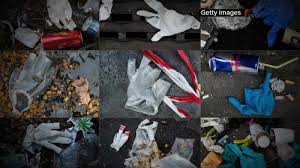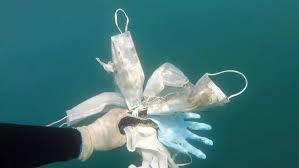
Masks to cover the face, gloves, packaging, or plastic cubicles for restaurants. Single-use plastic, which the world had declared war on, regains strength from the Coronavirus. And it becomes again new polluting waste.
In the new COVID-19 world, face masks, visors, and gloves are the new fashion accessories.
Hairdressers use disposable blouses, the UN recommends airlines cover their food plates with clear plastic sheeting, and protective screens of the same material are used in nursing homes during visits. California lifted the ban on using single-use bags for two months, but now in Saudi Arabia, some supermarkets are imposing disposable gloves on their customers.
Industrialists seized the opportunity: in the United States, the Plastics Industry Association asked since March 20th that its activity be considered “essential” in times of confinement. “Single-use plastic is a matter of life and death” in hospitals, wrote Tony Radoszewski, President of that lobby group, who also praised the role of single-use bags “to protect supermarket employees and consumers.”
The World Health Organization (WHO) questions this plastic protection
However, plastic is not absolute protection. For WHO, washing hands is more effective than wearing gloves. According to a study published in the American magazine NEJM, the Coronavirus survives up to two or three days in plastic, 24 hours in cardboard.
“For medical purposes, there is nothing better than single-use. But they want us to believe that it is an answer for daily consumption. It is a pressure group. Reusable does not pose a health problem,” insists Raphaël Guastavi, from WHO. French Energy Management Agency (Ademe), sees positive that “the European representatives do not want to give in” to the pressure.

Pandemic waste
Since the COVID-19 Pandemic started, masks and gloves have been seen thrown on sidewalks and on beaches, from Hong Kong to Gaza. The World Wildlife Fund (WWF) calls for surveillance. In 2019, it had already estimated that 600,000 tons of plastic were being dumped in the Mediterranean, with this even higher beginning the summer season. “The culture battle against single-use plastic seemed to have been won. But today a loophole has opened up and we will have to respond to it,” says Pierre Cannet of WWF France.
“It is not easy to recycle a mask. The general approach of governments is to put them with household waste for incineration, which seems to us the best option,” says Arnaud Brunet, from the International Recycling Office (BIR), which brings together professionals from 70 countries.
About 350 million tons of plastics are produced annually worldwide, mainly in Asia (50%), North America (19%) and Europe (16%), with moderate but steady growth in production. Globally, for the first time since 2008; 2020 is forecast to be worse than 2019 in this category due to the Coronavirus crisis.

